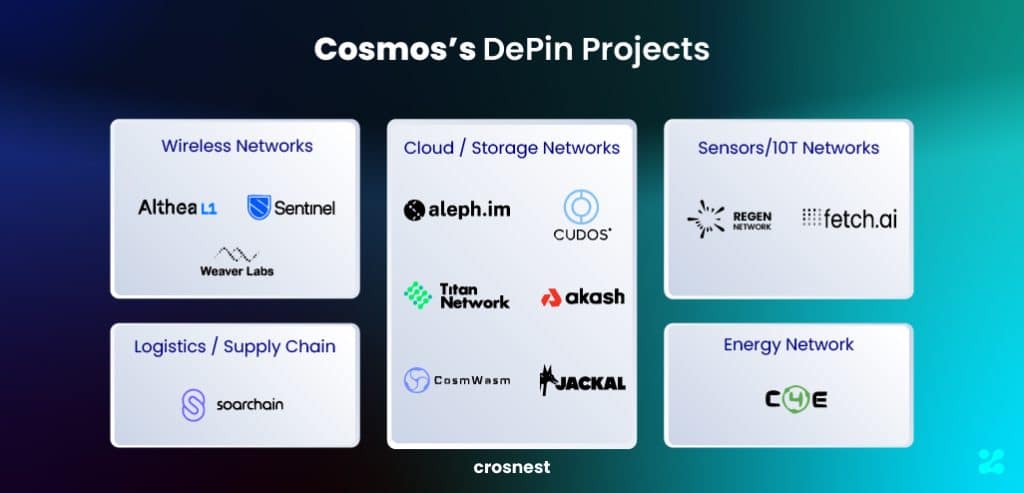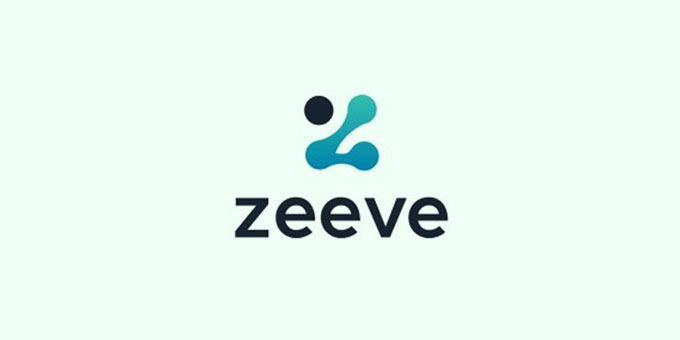DePIN is at a crucial intersection right now. As a potential 3.5 trillion market, (as reported by Messari), all these projects aren’t just challenging Web2 giants like Google and Amazon – they’re reimagining how physical infrastructure can be built, managed, and scaled. Yet a significant gap remains between Web3’s potential and mainstream adoption.
The challenge isn’t just technical – it’s existential. DePIN projects must achieve what traditional Web2 infrastructure providers have spent decades and billions perfecting: reliable, scalable, and cost-effective infrastructure services. But they must do it while maintaining decentralization and trust-minimized operations.
This is where infrastructure choices become critical. Among the various options available, Cosmos SDK has established itself as a leading choice for DePIN projects. Well, some even say the evolving ecosystem around the Cosmos SDK for DePIN is shaping it into the ideal framework for building robust physical infrastructure solutions.
Over 15+ Cosmos projects are built across wireless networks, mobility, cloud computing, sensor networks, and more. But what makes Cosmos SDK particularly suited for DePIN applications?

Let’s dive into their stacks, analyze the decisions, and see the on-chain metrics to answer why an increasing number of founders are choosing Cosmos SDK stack to build decentralized physical infrastructure products. As these projects mature, the Cosmos SDK for DePIN dynamic is becoming a clear differentiator, magnetizing more teams toward the stack.
Cosmos in undoubtedly the best space to build DePin right now
— marston.jkl (@MarstonConnell) November 29, 2024
Tech Challenges of DePIN Founders & How Cosmos SDK Solves Them?
Cosmos SDK provides the technical foundation that makes Depin’s demanding infrastructure viable in production environments. That’s quite a bit superficial, we know. So, what we did is we went through the data of all the Depin projects that Cosmos mentioned multiple times and analyzed what they say about Cosmos SDK, IBC, etc, and most importantly, how it has impacted their journey to reach where they are today.
From our analysis, it seems that the Cosmos SDK for DePIN approach doesn’t just simplify some technical challenges—it changes how complex infrastructures interact with your chain’s architecture. Hope this will be an interesting read with an ecosystem map in the end and a solid tip to launch a production-grade Cosmos SDK chain faster for your DePIN.
1. Hardware Integration Challange of DePIN
The challenge of connecting physical devices to blockchain infrastructure goes far beyond simple data recording. Each device has unique characteristics – location, capabilities, reliability – that must be tracked and verified in real-time. Traditional chains force these interactions through smart contracts, creating unnecessary complexity and points of failure.
Soarchain‘s mobility network implementation demonstrates how Cosmos SDK’s ABCI++ interface changes this relationship. Their system manages thousands of moving vehicles, each generating constant streams of location data, sensor readings, and availability proofs. Through ABCI++, they’ve implemented direct hardware state tracking that would be prohibitively expensive on a monolithic/ general-purpose chain.
“What we were able to do in maybe four months [on other chains], we did in two weeks with Tendermint Core,” said Deniz Kalaslioglu, CTO of Soarchain.
This dramatic improvement comes from capabilities unique to ABCI++:
- Direct hardware state management without smart contract overhead
- Custom validation rules for different device types
- Efficient batch processing for device updates
- Edge computing integration for immediate responses
1/8 🌟 Building on the @Cosmos stack has numerous advantages, and at Soarchain, we believe in leveraging the Inter-Blockchain Communication Protocol (IBC) for diverse, real-time, and secure data feeds that are going to be very valuable for many AI applications.
— Soarchain (@soar_chain) April 12, 2023
The impact extends beyond development speed. Soarchain’s network now handles thousands of vehicles, communicating their location, availability, and performance metrics in real time. These capabilities align perfectly with the needs of complex physical networks, reinforcing why many teams see the Cosmos SDK for DePIN as the go-to choice for hardware integration and real-time device management.
2. Processing Millions: The Scale Reality
When Sentinel began building their decentralized VPN network, they quickly discovered that traditional blockchain architectures couldn’t handle their transaction volume. Every node connection, status update, and service verification needed to be recorded on-chain, creating a tsunami of transactions that would cripple most networks.
Enter Cosmos SDK’s CometBFT consensus engine. Unlike traditional chains that struggle with high-frequency updates, CometBFT enables sub-second block times and parallel transaction processing. The results speak for themselves: Sentinel has processed over 300,000 transactions daily, with more than 12 million transactions in a month. Check today’s here.
(1) Sentinel Hub's transaction throughput is a testament to the scalability of the Cosmos-SDK.
— Sentinel ⚛️ P2P DePIN/DeAI dVPN and AI Data Layer (@SentinelDVPN) February 7, 2024
With over 300k transactions per day in the recent days and over 12 million transactions in the last 30 days, there is no other stack that can handle what the Sentinel ecosystem needs. pic.twitter.com/SVDMXNlER5
This scale, achieved with Cosmos SDK at its core, illustrates how the Cosmos SDK for DePIN approach ensures that performance doesn’t falter under the real-world pressures of rapid and continuous data flow. Each transaction represents complex operations:
- Node health verification
- Connection quality monitoring
- Service availability checks
- Bandwidth allocation tracking
The network manages these transactions while keeping costs minimal and confirmation times near-instant, essential for a service where users expect VPN connections to be established immediately.
What makes this possible? Cosmos SDK’s approach to transaction processing includes dedicated state channels for device updates, optimized memory management, and efficient state pruning mechanisms. These technical capabilities have enabled Sentinel to scale to over 7,500 nodes while maintaining network responsiveness.
3. Building Trust in Physical Assets
The challenge of securing physical infrastructure adds another layer of complexity to DePIN applications. How do you verify that storage nodes actually maintain your data? How do you handle node failures without compromising security?
Jackal Protocol’s implementation showcases how Cosmos SDK’s modular architecture enables sophisticated security solutions. Their system doesn’t just track storage space – it verifies actual data availability through custom validation mechanisms built directly into the chain’s logic.
Jackal harnesses the power of the IBC to enable ultra-secure storage for a myriad of use cases across Web3.
— JACKAL (@Jackal_Protocol) May 5, 2023
The Jackal Protocol's ability to integrate with traditional Web2 industries attracts a new market to the @cosmos.
Read more!
⬇️⬇️⬇️https://t.co/GXaSjkDYLW
Their solution leverages Cosmos SDK’s modular architecture to implement:
- Geographic-aware consensus mechanisms
- Multi-region verification protocols
- Automated failover systems
- Real-time storage proofs
Here again, the flexibility inherent in the Cosmos SDK for DePIN allows for seamless integration of advanced verification layers, ensuring that trust in physical assets isn’t a luxury but a baseline expectation. When a storage node joins the Jackal network, it undergoes continuous verification through:
The system maintains redundancy without sacrificing decentralization, automatically rebalancing data across nodes based on geographic distribution and performance metrics. If a node fails or becomes unavailable, the network initiates automatic recovery procedures without requiring manual intervention.
“If an outage or natural disaster prevented one data center from posting storage proofs, the system would auto-heal, and a new storage provider would be alerted,” says Patrick Dunlop, CEO of Jackal Protocol. This level of automation and security would be difficult to implement on traditional chains without significant overhead.
This architecture enables Jackal to offer storage solutions that match centralized providers in reliability while adding true decentralization. Their implementation shows how proper blockchain architecture can establish trust in physical infrastructure services.
4. Cross-Chain Asset Management Through IBC
Physical infrastructure doesn’t exist in isolation. A decentralized wireless network might need to interact with storage providers, payment systems, and other services simultaneously. This is where Cosmos SDK’s Inter-Blockchain Communication (IBC) protocol proves super efficient.
Althea‘s decentralized internet service shows why cross-chain capabilities matter for DePIN. Operating across 13 US states and 4 countries, their decentralized internet infrastructure requires seamless interaction between multiple systems – from processing machine-to-machine payments to verifying service delivery across different networks. Traditional monolithic architectures simply can’t handle this complexity efficiently.
“IBC is very important. It provides out-of-box interoperability with more than 100 chains, making it essential for our machine-to-machine transactions and RWA tokenization,” said Deborah Simpier, CEO of Althea.
The impact shows in their operations:
- Seamless payment processing across chains
- Real-time service verification
- Efficient resource allocation
- Cross-chain governance capabilities
Althea now processes 4 PB of internet traffic across multiple jurisdictions while maintaining decentralization. Soarchain utilized IBC to enable AI applications to access vehicle data across multiple chains, while Jackal Protocol leveraged it for distributed storage verification.
In all these cases, the Cosmos SDK for DePIN implementations ensures that projects aren’t limited by siloed chains, but rather free to connect and coordinate resources across an entire blockchain ecosystem.
5. DePIN Viable Infrastructure Economics
“If you don’t control what the gas fees are, a lot of use cases are deleted out of existence purely because the unit economics wouldn’t work,” so nicely put by Patrick Dunlop of Jackal Protocol.
This applies so well in Physical Resource Networks (PRNs).
The economics of physical infrastructure create a unique challenge for blockchain networks. Every device update, status check, and service verification has a cost. A pre-set fee structures make these operations prohibitively expensive at scale, effectively killing many promising DePIN projects before they can reach critical mass.
Akash Network‘s marketplace shows how Cosmos SDK’s flexible fee structure changes this equation. Their compute costs run 85% lower than hyperscale cloud providers, not as a marketing tactic but as a fundamental result of their architectural choices. This isn’t just about lower fees – it’s about creating sustainable economics for real-world infrastructure.
Cosmos SDK enables projects to implement custom fee structures optimized for their specific use case rather than forcing them into a one-size-fits-all model.
Consider the real-world impact: A network of thousands of IoT devices might need to update their status every few minutes. On traditional chains, each update would incur a standard gas fee, making the system economically unfeasible. With Cosmos SDK’s customizable fee structures, projects can:
- Implement batch processing for device updates
- Create specialized fee structures for different operations
- Optimize gas costs for common infrastructure tasks
- Enable fee-less operations for certain critical functions
Over 2,200 active compute leases demonstrate the viability of their model. Akash proves that properly designed blockchain economics can make decentralized infrastructure competitive with established providers.
This economic flexibility exemplifies how the Cosmos SDK for DePIN supports financially sustainable models, allowing new infrastructure solutions to flourish without facing crippling costs.
6. Flexibility Built Action Control:
Perhaps the most critical challenge for DePIN projects isn’t today’s problems – it’s tomorrow’s. Physical infrastructure evolves rapidly, and blockchain systems must adapt just as quickly. Traditional chains often require hard forks or complete rebuilds to implement major changes, creating significant risk for infrastructure projects.
Titan Network‘s approach showcases how Cosmos SDK’s modular architecture enables evolution without disruption.
“In our initial stages, we plan to employ Cosmos’s native POS or DPOS consensus mechanisms, eventually transitioning to the narwhal + bullshark consensus algorithm before our mainnet launch,” says their Github.
They also showcase how Cosmos SDK enables this flexibility, processing up to 400,000 TPS in lab tests while maintaining complete control over network specifications.
This planned evolution would be nearly impossible on most blockchain platforms. The modular architecture enables projects to:
- Upgrade network parameters without disrupting operations
- Implement new security protocols as threats evolve
- Add support for new types of physical infrastructure
- Integrate emerging technologies like AI and quantum resistance
This capacity to evolve underpins the Cosmos SDK for DePIN strategy: it’s not about solving one problem—it’s about architecting an enduring, future-proof environment for changing infrastructure needs.
Chain4Energy (C4E) also has this adaptability in practice. Their blockchain handles up to 20,000 transactions per second while maintaining the flexibility to integrate new energy trading mechanisms as the market evolves. This combination of performance and adaptability is crucial for infrastructure projects that must maintain service while evolving.
All Cosmos SDK x DePIN Projects at a Glance with Sub-sectors

Deploying Production-Ready Cosmos SDK Chains on Zeeve
If you’re gearing up to launch a standalone chain and harness the potential of the Cosmos SDK for DePIN, you’re inevitably going to face some operational complexities of managing wallets, explorers, integrations, and a diverse mix of node types. This is where Zeeve steps in. By offering reliable infrastructure and enabling you to customize Cosmos modules, white-label explorers, integrate faucets, align data indexing protocols, and add on-demand integrations, Zeeve accelerates your path to a full-fledged DePIN network. You can deploy your Cosmos SDK-based L1 with a robust toolset—IBC, Tendermint, and more—ready for prime time.
Connect with our consultants or schedule a quick call, and we’ll help turn your DePIN vision into a resilient, production-grade reality.






















